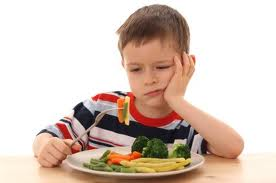 I have a picky eater at home, no doubt about that. But I find it’s not always my son (wink, wink). However, that being said, it’s always important to be a good role model for your kid(s). If you don’t like broccoli and say that at the dinner table, then your child will demonstrate that behavior.
I have a picky eater at home, no doubt about that. But I find it’s not always my son (wink, wink). However, that being said, it’s always important to be a good role model for your kid(s). If you don’t like broccoli and say that at the dinner table, then your child will demonstrate that behavior.
One of the best authors on this subject is Ellyn Satter. She wrote several books on infant and toddler feeding. She emphasized the parent responsibilities of providing the what, where, and when food will be served, and children choosing whether, what, and how much to eat from the healthy choices you provide, as a parent.
Relax. Most children are picky eaters and extremely cautious about trying new foods. Did you know it takes 15-20 offerings of a specific food before a child will actually eat it? If they don’t eat it, keep trying. Always offer the fruit or vegetable.
Set the example. Serve and eat a variety of healthy foods yourself. Especially at snack time, if children are really hungry, they will eat the sliced apple or carrot sticks.
Don’t be a short-order cook. Don’t cook separate meals for your child or limit your family menu to foods your child will accept. But do try to see that every meal contains one item you know your child will eat. For example, offer bread and butter as part of the meal. You now have provided them with at least one item they will like to eat and stay seated at the table with the family. AND BE OK with them eating only that food, if need be.
Model and teach good table manners. For example, “if someone offers you something you don’t want, it’s ‘No, thank you’ – not ‘Ew! Yuck!” I’m constantly reminding my son of this little piece of advice. This goes for adults, too. I had a woman tell me her husband would make the comments at the table about not liking a certain vegetable. So remember to set the example.
Back off. Don’t coax or pressure your child to eat. No bribing, cheerleading, or nagging. (Refer back to your responsibilities.) I know this is difficult…it’s difficult for me, too. But if you do, you just gave your child the power. He was looking for your reaction/attention to his refusal to eat. Ignore them and don’t praise them either. It sets the stage for them to eat for you, not because they are hungery and enjoy the food.
Get them involved. Have your child help plan and/or prepare the meals. Get everyone involved. Have the children choose their favorite fruit or vegetable at the store and you can prepare it. Most young children under 5 years old can try to help set the table, tear lettuce for salad, or grow a pot of herbs in the back yard.
Find creative ways to add nutritional value to tasty favorites. Make quick breads or muffins with shredded carrots or zucchini, pumpkin, or squash puree. Caution: Vegetables and fruits should always be visible on your child’s plate at meal times. Don’t think that “hiding” the vegetable in his foods will always help. Always offer the fruit or vegetable, even if they don’t eat it.
The goal is to have a happy and loving meal environment at the table. What will happen when your child goes to school for lunch or a friend’s house for dinner…? Children need to see (and hopefully try) different fruits and vegetables at regular snack and meal times that you provide.
Just remember to be the role model and stay calm. We want children to enjoy the meal times and not be forced to eat food they are not ready to try. Always offer healthy options. I would never have known my son to eat cauliflower unless I offered it. You might be surprised when they eat it 🙂

